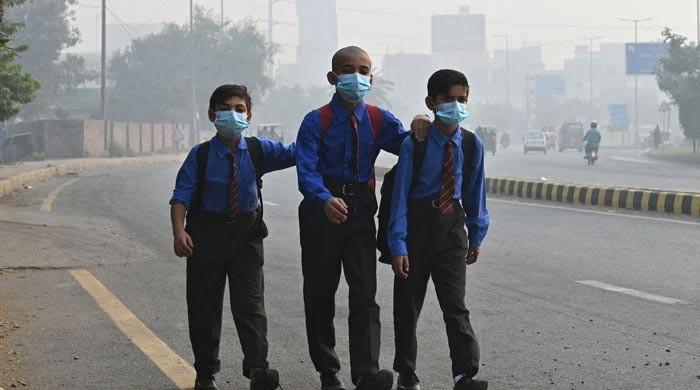PM2.5 pollutants in Karachi’s air 25.8 times higher than WHO guidelines.
Air quality in port city deteriorates to “very unhealthy” level on IQ Air list.
Multan ranks as most polluted city in Pakistan in terms of air quality.
The air quality in Karachi saw a sharp decline on Friday morning as the temperatures go down in the metropolis, trapping pollutants close to the ground, while Punjab capital Lahore stays on top of global pollution rankings.
The air quality index in the port city shot up to “very unhealthy” 220, making Karachi the fourth most polluted city in the world in terms of air pollution.
As per the Swiss group’s live air quality monitor, the (PM2.5) pollutants — the fine particulate matter in Karachi’s air that causes the most damage to health — was 25.8 times higher than the World Health Organisation’s (WHO) annual air quality guideline value around 9am.
Meanwhile, the AQI in Lahore was recorded at 732, with the level of PM2.5 pollutants 88.4 times higher than the WHO’s guideline values.
However, Multan had the worst air quality in Pakistan with an AQI as hazardous as 810. Here the level of PM2.5 pollutants was 96.2 times higher than the WHO’s guideline values.
With thick smog enveloping the megapolis, visibility in various areas of Lahore and surroundings dropped to zero, leading to closure of M-2 motorway from Islamabad to Lahore, M-3 motorway from Lahore to Dera Ghazi Khan and Lahore-Sialkot Motorway.
The road closures included M-4 motorway from Pindi Bhattian to Multan and from Multan to Toba Tek Singh. Moreover, the M-5 motorway was also blocked from Multan to Jalalpur and Multan to Sukkur as the smog-laded air floated towards Sindh after plaguing Punjab and Khyber Pakhtunkhwa.
As Punjab continues to battle smog crisis, more cities remained enveloped by toxic air.
In Faisalabad, where the AQI reached 497 at some point this morning, residents complained of eye irritation and breathing difficulties due to the severity of the smog.
Meanwhile, Gujranwala reported a road accident due to low visibility, when a bus crashed into a stationary truck near Majoo Chak on the highway.
According to rescue officials, seven people, including three children, were injured.
The relentless smog crisis, caused by a combination of vehicle emissions, industrial pollution, and crop burning, has affected the health and livelihood of millions across Punjab, prompting urgent calls for the government to take immediate action to reduce pollution and safeguard the well-being of its people.
The provincial authorities have blamed its toxic air this year on pollution wafting in from India, where northern parts have also been battling hazardous air, and has said it will take the issue up with the neighbouring country through its foreign ministry.
Several parts of South Asia are engulfed by a toxic haze each winter as cold air traps dust, emissions and smoke from farm fires.

